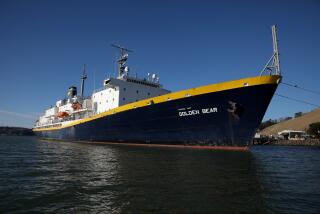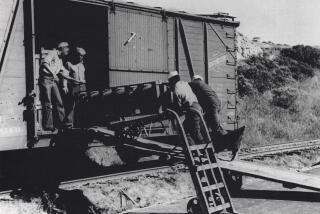Navy Reopens Files on Asbestos Job : Health: It now wants to find out whether any staff members knew about the botched removal aboard the aircraft carrier Ranger and, if so, why no action was taken.
- Share via
The Navy’s investigative arm is re-examining its inquiry into a botched asbestos removal aboard the aircraft carrier Ranger to find out which Navy staff members were aware of problems and what, if anything, they did about them, sources said Tuesday.
The decision follows reports in The Times indicating that a civilian safety inspector had warned the Navy about dangerous asbestos removal practices aboard the Ranger, although the top officer in charge of overseeing the removal had said he knew nothing about the violations.
The Naval Investigative Service reopened its files to find out whether the Navy had been informed, and, if it had been, why the information never resulted in action, a source said.
Officials with the Pacific Fleet’s Naval Air Force, which has jurisdiction over the vessel, launched a separate investigation Tuesday, said Lt. Cmdr. Bob Pritchard, a Navy spokesman. In an effort to verify that the Ranger is safe, Navy officials have decided to test the air aboard it to ensure that no asbestos fibers are present, he said.
The Ranger, which carries about 5,000 sailors and airmen, is at sea conducting exercises and will return to North Island Naval Air Station this week. Navy officers will also try to determine which sailors may have been exposed to the cancer-causing material.
Tom Bohler, safety manager for Continental Maritime of San Diego, said Monday that he inspected the Ranger after his employees complained that workers from another company, California Marine Commercial Insulation, ripped out asbestos-covered pipes from the carrier without using safety precautions--potentially exposing hundreds of sailors.
Last Friday, CMCI and company president and owner Frank Chavez pleaded guilty to failing to take adequate precautions when they removed more than 260 feet of the pipes. CMCI worked intermittently aboard the Ranger while the ship was docked at North Island from September to March.
Believing the asbestos removal was improper, Bohler said, he spoke to Chief Petty Officer Donna Ward of the Supervisor of Shipbuilding, Conversion and Repair, the monitoring arm responsible for preparing contracts and overseeing work on vessels. He wrote a memo after the conversation Jan. 4., a copy of which was obtained by The Times.
“We wanted the government to be aware of it, because they were also endangering the ship’s sailors,” Bohler said. “We wanted to let them know they had a real problem, because people were in that area not knowing there was asbestos.”
Bohler “gave (Ward) details of the incident, and she informed me that she would investigate the problem,” according to the memo, which is addressed to Continental Maritime’s safety department and signed by Bohler.
Reached by phone, Ward declined comment, saying: “We are not allowed to give any comments at all on this. The case is still under investigation. My only answer is ‘No comment.’ ”
Today, Navy officials are investigating what Ward knew and whether she informed others in her office. They will also try to determine why no action was taken.
Capt. Vern Edwards, commanding officer of Supervisor of Shipbuilding, Conversion and Repair, told The Times last week that he was unaware of any problems concerning the asbestos removal.
“I have no idea about there being any problem anywhere,” Edwards said. “I guess my responsibility as a supervisor is to ensure to the best of our ability that what we asked for in the contract is being executed in accordance with the contract.”
Edwards did not return calls to his office Monday or Tuesday.
Asbestos, banned in 1979 for most construction purposes, can cause cancer and asbestosis, a fatal lung ailment. It is dangerous if inhaled into the lungs, where even one microscopic fiber can cause a fatal disease.
The federal charges, filed last week against CMCI and Chavez, sprang from an eight-month investigation by the Naval Investigative Service.
More to Read
Sign up for Essential California
The most important California stories and recommendations in your inbox every morning.
You may occasionally receive promotional content from the Los Angeles Times.













